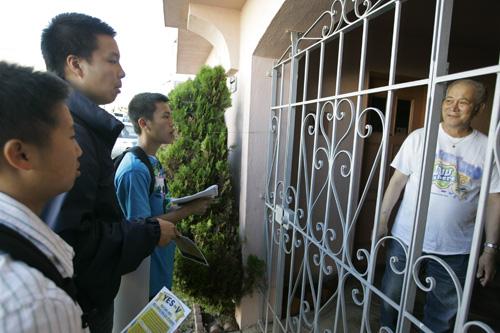California students campaign to keep Junior ROTC program alive

From left, students Steven Zheng, Roger Vien and Anthony Truong campaign for support for the JROTC in San Francisco on Wednesday. Eric Risberg, The Assoicated Press
October 2, 2008
SAN FRANCISCO – In this city long associated with the peace movement, some teens are taking an unlikely stance – campaigning to keep the armed forces’ Junior ROTC program in public schools.
If a school board decision stands, San Francisco would become the first city to remove a Junior Reserve Officers’ Training Corps program. But supporters, including many college-bound Asian-American students who make up the majority of cadets here, initiated an advisory measure on the November ballot. They hope it will persuade a new school board to save JROTC.
Board members who decided to kick JROTC out of town see it as arm of the military that reaches into schools, discriminating against gays by enforcing the “don’t ask, don’t tell” mandate, and recruiting teenagers for an unpopular war.
“It’s a broader issue about the Bush administration and military recruiting through JROTC,” said board member Eric Mar. “It’s clear with the military, if you’re gay and out, you don’t get the same opportunities,” he added.
He was among board members who voted two years ago to phase out JROTC and replace it with programs not linked to the military. The deadline was set for 2008, but the board later extended JROTC until next June because an alternative was not developed in time.
Get The Daily Illini in your inbox!
Participants, called cadets, wear uniforms, study military history, practice marching and drilling and can win awards for things like marksmanship. Armed forces retirees serve as instructors, and cadets can get academic credit in fields such as physical education.
If the aim is recruitment, however, JROTC in San Francisco is a failure. Only two of the 1,465 cadets there signed up for the armed forces after graduation in 2006-2007, the latest year for which numbers are available.
Supporters view the elective course as valuable self-improvement – teaching them discipline, responsibility and leadership skills they say they do not get in other classes. JROTC rules prevent instructors from trying to recruit participants.
“It’s helped me stand up for myself, have more confidence, and to fight for what I want,” said Trina Mao, 16, standing on a corner in Union Square passing out fliers about the program.
They also say the arguments about the war in Iraq and the Pentagon’s policy toward gays miss the point: The program in San Francisco is inclusive, with 90 percent minorities and 40 percent women, they say.
Even as the debate went on and board members held their ground, students and their parents gathered enough signatures to put an advisory measure on the ballot asking voters to show their support for keeping JROTC.
The ACLU intervened in cases where entire classes were enrolled in JROTC without giving students a choice, or where cash-strapped schools used JROTC to substitute for physical education, said Jennifer Turner, a researcher with the group’s Human Rights Program.






